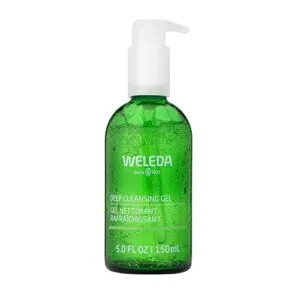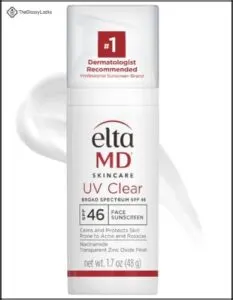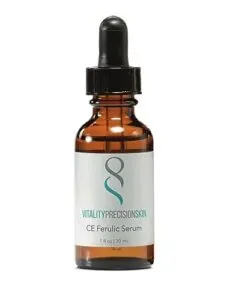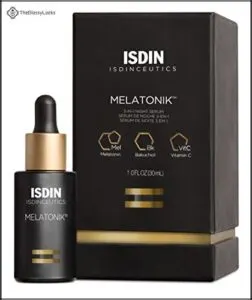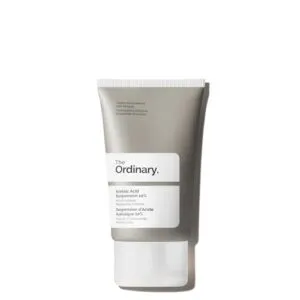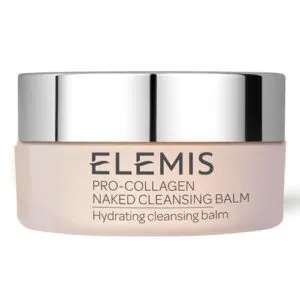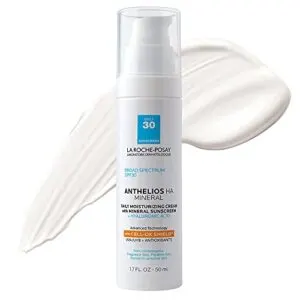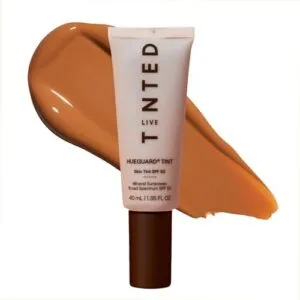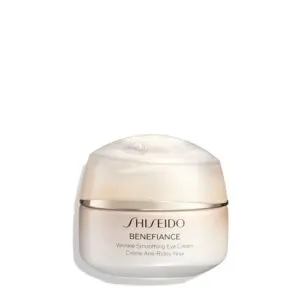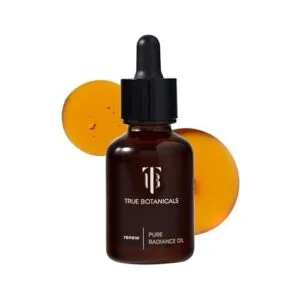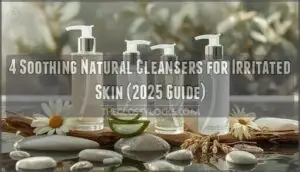This site is supported by our readers. We may earn a commission, at no cost to you, if you purchase through links.
Your skin doesn’t need to feel like a battleground while you’re growing a baby. Yet nearly 70% of pregnant women report increased skin sensitivity—triggered by hormonal surges that disrupt your skin’s protective barrier and turn formerly trusted products into sources of redness and irritation.
The culprit isn’t just your changing body; it’s the combination of estrogen spikes, increased blood flow, and heightened reactivity to everything from your laundry detergent to your morning face wash.
The good news? You can protect and soothe your sensitive pregnancy skin with the right ingredient swaps and gentle routine adjustments that work with your body’s changes instead of against them.
Table Of Contents
- Key Takeaways
- What Causes Sensitive Skin During Pregnancy
- Recognizing Sensitive Skin Symptoms While Pregnant
- Safe Skincare Ingredients for Pregnancy
- Ingredients to Avoid on Sensitive Skin
- Building a Gentle Pregnancy Skincare Routine
- Top 10 Products for Sensitive Pregnancy Skin
- 1. Weleda Deep Cleansing Gel Cleanser
- 2. EltaMD UV Clear Face Sunscreen
- 3. Vitality Precision Skin Serum
- 4. Isdin Melatonik Overnight Recovery Serum
- 5. Azelaic Acid Skin Brightening Serum
- 6. Pro Collagen Cleansing Balm Remover
- 7. Mineral Sunscreen Moisturizer For Face
- 8. Tinted Mineral Sunscreen With Spf
- 9. Wrinkle Smoothing Eye Care Cream
- 10. Natural Anti Aging Face Oil
- Preventing Sensitive Skin Flare-Ups During Pregnancy
- Treating Sensitive Skin Reactions Safely
- Frequently Asked Questions (FAQs)
- Conclusion
Key Takeaways
- Pregnancy triggers skin sensitivity in nearly 70% of women through hormonal surges that weaken the skin barrier, making formerly safe products suddenly irritating—but switching to gentle, pregnancy-safe ingredients like niacinamide, azelaic acid, and mineral sunscreens can protect and calm reactive skin.
- You must avoid retinoids, high-dose salicylic acid, synthetic fragrances, and harsh sulfates during pregnancy since they either pose fetal risks or strip your compromised skin barrier, while hyaluronic acid, ceramides, and zinc oxide sunscreens offer safe, effective alternatives.
- Building a minimal four-step routine—gentle pH-balanced cleansing, barrier-supporting moisturizers with ceramides, mineral SPF 30+ sunscreen, and targeted treatments like azelaic acid—prevents flare-ups better than complicated regimens that overwhelm sensitive pregnancy skin.
- Prevention matters more than treatment: apply mineral sunscreen every two hours to avoid melasma affecting 70% of pregnant women, drink 2.3 liters of water daily to counter the 10-20% hydration loss, and eliminate fragrance-heavy detergents that cause 24% of pregnancy-related dermatitis.
What Causes Sensitive Skin During Pregnancy
Your skin doesn’t need to be difficult before pregnancy to become sensitive during it. Hormonal shifts, everyday products, and even the weather can suddenly turn your skin reactive when you’re expecting.
Here’s what’s behind these changes and where they’re most likely to show up.
Hormonal Changes and Skin Sensitivity
Your skin’s sensitivity during pregnancy stems from a surge in estrogen and progesterone, which peak in the third trimester. These hormonal changes compromise your skin barrier slightly and ramp up melanin production, triggering hyperpigmentation in up to 90% of expectant mothers.
You might notice the pregnancy glow alongside heightened reactivity to products you once tolerated. Hormone fluctuations also increase blood flow and oil gland activity, making your skin more vulnerable to sensitivity triggers and inflammation.
Common Triggers and Irritants
Beyond hormonal changes, your pregnancy skin faces multiple daily triggers. Detergents and fragrances in household products can cause dryness and redness, while synthetic dyes increase sensitivity. You’re also more vulnerable to environmental factors like UV radiation, heat, and chlorine—all capable of triggering inflammation.
Common irritants include:
- Harsh cleansers and surfactants that strip your skin’s natural oils
- Synthetic fragrances and dyes in skincare and laundry products
- Chemical sunscreen filters like oxybenzone that may cause reactions
- Food allergens such as nuts, shellfish, and dairy triggering skin flare-ups
- Heat and chlorinated water worsening dryness and irritation
Even products you’ve used for years can suddenly provoke skin irritation during pregnancy.
Areas Most Affected by Sensitivity
Your belly is ground zero for sensitivity—stretching skin makes it itchy and tender, especially as pregnancy progresses. Facial redness and pigmentation changes affect over half of expectant mothers, while breast tenderness increases as tissues swell.
Your hips, thighs, and buttocks also experience abdominal itching and skin irritation from expanding tissue. These areas react more intensely to skin care products you once tolerated, demanding gentler formulas that respect heightened skin sensitivity during pregnancy.
Recognizing Sensitive Skin Symptoms While Pregnant
Your skin speaks up when something’s off, and during pregnancy, those signals can be louder than usual. Knowing what to watch for helps you respond quickly and keep yourself comfortable.
Here’s how sensitive skin shows itself and when it’s time to loop in your doctor.
Redness, Itching, and Inflammation
During pregnancy, your body’s trying to do something remarkable—and your skin might protest. You’ll notice redness on your face, belly, or thighs as blood flow increases and hormones shift.
Itching can range from mild annoyance to intense discomfort, especially on stretched areas. Inflammation shows up as swelling, burning, or stinging when you apply products that never bothered you before.
These sensitive skin symptoms are your body’s way of signaling it needs gentler care right now.
When to Consult Your Doctor
Most sensitive skin symptoms are normal, but certain warning signs demand immediate attention. Severe itching on your palms or soles might signal cholestasis—a liver condition affecting 1-2% of pregnancies that needs urgent medical guidance. Contact your OBGYN or dermatologist right away if you experience:
- Blisters, pus-filled bumps, or rapidly spreading rashes that could indicate skin infections
- Persistent skin irritation lasting over two weeks without improvement
- Emergency symptoms like difficulty breathing, swelling, or fever alongside your rash
- Intense itching without visible rash, potentially signaling pregnancy complications
Safe Skincare Ingredients for Pregnancy
When you’re pregnant, your skincare routine needs ingredients that work without worry. Not everything in your bathroom is safe right now, but several proven actives can support your sensitive skin through hormonal shifts and increased reactivity.
Here’s what dermatologists recommend you can reach for with confidence.
Vitamin C and Niacinamide
Your pregnancy glow comes with a bonus: vitamin C and niacinamide are two powerhouse safe skincare ingredients during pregnancy. Topical vitamin C delivers antioxidant benefits and skin brightening without irritation, while niacinamide strengthens your barrier and addresses hyperpigmentation—up to 75% of expectant mothers deal with melasma.
Both boost collagen production and work beautifully in facial serums, offering pregnancy skincare that’s effective and reassuring.
Azelaic Acid and Bakuchiol
Azelaic acid addresses pregnancy acne and melasma without crossing into risky territory—it works gently on the surface and doesn’t get absorbed systemically. Bakuchiol steps in as your retinol stand-in, offering anti-aging benefits with no teratogenic red flags.
- Azelaic acid calms inflammation and fades dark spots safely, with clinical reviews confirming no fetal risk
- Bakuchiol provides cell turnover and collagen support minus vitamin A’s pregnancy concerns
- Both gentle exfoliants brighten skin without harsh acids, making them ideal pregnancy skincare ingredients during pregnancy for sensitive skin
Dermatologists recommend azelaic acid as a first-line natural alternative for skin brightening, while bakuchiol delivers acid benefits through a plant-based route—both support pregnancy safety.
Hyaluronic Acid and Ceramides
When your skin barrier feels paper-thin, hyaluronic acid and ceramides become your hydration dream team. Hyaluronic acid pulls moisture deep into your epidermis—holding up to 1,000 times its weight in water—while ceramides patch up the gaps that hormonal changes create.
Together, they tackle dryness and reinforce barrier repair without any pregnancy safety concerns, making them essential skincare ingredients for sensitive skin needing serious moisture retention and skin hydration support.
Mineral Sunscreen Actives
When UV rays threaten to worsen melasma and sensitivity, zinc oxide and titanium dioxide step up as your safest defense. These mineral actives sit on your skin’s surface, reflecting light like tiny shields instead of absorbing into your bloodstream.
Physical barriers offer at least 10% zinc oxide for effective sun protection without the irritation risk of chemical filters, making mineral sunscreen your go-to choice for pregnancy-safe photoprotection and preventing pigmentary flare-ups.
Ingredients to Avoid on Sensitive Skin
When your skin is already sensitive during pregnancy, certain ingredients can make things worse. Some common skincare components—even ones you’ve used safely before—can now trigger irritation, redness, or breakouts.
Here’s what to watch out for and why these ingredients don’t belong in your pregnancy routine.
Retinoids and Chemical Exfoliants
Retinoids—including retinol—aren’t just off-limits during pregnancy; they’re linked to a 20–30% increased risk of birth defects affecting the face and heart. Even topical versions pose teratogenic effects, so you’ll want to stop use at least one month before trying to conceive.
Retinoids carry a 20–30% birth defect risk during pregnancy—stop use at least one month before conceiving
Chemical exfoliants like salicylic acid also absorb through your skin barrier at rates up to 25%, raising safety concerns. Swap these for gentler options like azelaic acid or enzyme-based treatments instead.
Fragrances and Synthetic Dyes
You might think fragrance-free means boring, but it’s actually your smartest move. Synthetic fragrances often hide phthalates—endocrine disruptors tied to developmental problems. Meanwhile, synthetic dyes carry carcinogenic risks yet still show up in cosmetics.
Chemical irritants to skip:
- Phthalate-containing fragrances
- Formaldehyde-releasing preservatives
- Parabens (found in umbilical cord blood)
- Azo dyes
- Products listing “fragrance” without specifics
Natural alternatives protect sensitive skin during pregnancy without the hidden risks.
Harsh Detergents and Additives
Beyond artificial perfumes and dyes, your cleansers deserve scrutiny too. Sodium lauryl sulfate can disrupt your skin barrier and spike water loss by 25–40%. Triclosan interferes with hormones, while high-pH detergents strip protective lipids. Pregnancy makes you 1.5 to 2 times more vulnerable to detergent irritation, so switching matters now.
| Common Detergent | Why It’s Problematic | Safer Swap |
|---|---|---|
| Sodium lauryl sulfate | Breaks down skin barrier | Sulfate free cleansers |
| Triclosan | Hormonal interference | Gentle skin cleansers |
| High-pH foaming agents | Strips protective oils | pH balance formulas |
| Alkylphenol ethoxylates | Estrogenic activity | Detergent alternatives |
| Formaldehyde releasers | Allergic reactions | Surfactant-free options |
Your dermatologist can recommend products without harsh surfactants that still clean effectively without irritating sensitive skin.
Building a Gentle Pregnancy Skincare Routine
When your skin feels more reactive than usual, the right routine can make all the difference. A gentle approach focuses on four essential steps that work together to calm irritation and protect your changing skin.
Let’s walk through each one so you can build a routine that feels safe and supportable throughout your pregnancy.
Cleansing Without Stripping
Choosing a cleanser for pregnancy starts with pH balance. Your skin naturally sits around 4.7, and anything above 6.0 can compromise your barrier when hormones already have your sensitivity running high.
Look for amino acid–based surfactants like sodium cocoyl glutamate, which cut irritation by 40% compared to sulfates. Gentle cleansers with glycerin or hyaluronic acid help lock in moisture, while low-foam formulas keep hydration intact.
Stick to fragrance-free, noncomedogenic options that won’t strip your skin or trigger flare-ups.
Moisturizing for Hydration and Barrier Support
After cleansing, your skin needs moisture to counter increased transepidermal water loss—especially during your second trimester when your lipid profile shifts. Hyaluronic acid holds over 1,000 times its weight in water, plumping skin and preventing stretch marks.
Ceramides in gentle moisturizers like CeraVe rebuild your barrier as it stretches. Look for fragrance-free formulas with niacinamide and glycerin—they’ve been shown to improve skin hydration and elasticity within two weeks, keeping sensitive skin calm.
Sun Protection for Sensitive Skin
During pregnancy, your melanin production spikes, making UV protection non-negotiable. Mineral sunscreens with zinc oxide or titanium dioxide sit on the skin’s surface—they’re not absorbed like chemical filters that may affect fetal development.
Choose broad spectrum SPF 30 or higher and apply one ounce 15 minutes before sun exposure. Reapply every two hours, especially between 10 a.m. and 2 p.m. when rays peak.
Mineral formulas shield sensitive skin from both pigmentation and inflammation without triggering reactions.
Targeted Treatments for Problem Areas
Hyperpigmentation, acne, and eczema flare-ups need specialized attention, but you don’t have to sacrifice safety. Azelaic acid addresses dark spots and breakouts in one step, while niacinamide at 4–5% brightens without risk. For skin exfoliation on sensitive areas, stick to low-concentration glycolic acid (<10%) once or twice weekly—gentle peels beat aggressive micro needling during pregnancy.
Safe targeted treatments include:
- Azelaic acid 15% for acne and hyperpigmentation
- Niacinamide serums to brighten melasma-prone areas
- Gentle peels with <10% glycolic acid for exfoliation
- Hydrating facial massage to boost circulation without irritation
- Ceramide-rich spot treatments for eczema patches
Skip lasers and avoid harsh skincare product recommendations that promise overnight results.
Top 10 Products for Sensitive Pregnancy Skin
When your skin feels extra reactive during pregnancy, choosing the right products becomes essential for both comfort and safety.
The following ten options have been carefully selected for their gentle formulations and pregnancy-safe ingredients. Each product targets a specific step in your skincare routine while respecting your skin’s heightened sensitivity.
1. Weleda Deep Cleansing Gel Cleanser
When your regular face wash suddenly feels like a no-go zone, you’ll want to reach for Weleda Deep Cleansing Gel. This vegan cleanser relies on natural ingredients like aloe vera and witch hazel to remove impurities without triggering the redness or tightness that often plague sensitive skin during pregnancy.
Plant-based surfactants respect your skin pH while providing gentle exfoliation, and the formula skips parabens, phthalates, and synthetic fragrances—common culprits behind pregnancy skincare flare-ups.
Dermatologically tested and NaTrue certified, it cleanses thoroughly without stripping your moisture barrier, leaving skin soft rather than reactive.
Best For: Pregnant individuals with normal, combination, or oily skin seeking a gentle, natural cleanser that removes impurities without irritation or dryness.
- Plant-based formula free from parabens, phthalates, synthetic fragrances, and harsh chemicals—ideal for pregnancy-sensitive skin
- Clinically tested with 89% of users reporting thorough cleansing and 88% experiencing soft, supple skin without tightness
- Vegan, cruelty-free, NaTrue certified, and packaged in recyclable materials for eco-conscious shoppers
- May not be specifically formulated for acne-prone or highly sensitive skin, potentially causing breakouts in some users
- Natural citrus essential oils could trigger reactions in individuals with fragrance sensitivities
- Packaging could be more eco-friendly despite recyclable components
2. EltaMD UV Clear Face Sunscreen
When pregnancy hormones turn your complexion into a minefield, EltaMD UV Clear Face Sunscreen offers a mineral-based shield you can trust. This dermatologist-recommended formula combines 9% zinc oxide with 5% niacinamide—a powerhouse duo that protects against UV damage while calming redness and inflammation common in sensitive pregnancy skin.
The lightweight, oil-free texture won’t clog pores or trigger breakouts, and it layers seamlessly under makeup. Though it contains octinoxate (a chemical filter some pregnant women prefer to avoid), the high zinc oxide content and fragrance-free formulation make it a go-to for facial care when your skin needs both protection and gentleness.
Best For: Pregnant women with sensitive, acne-prone, or rosacea-affected skin who need gentle sun protection with anti-inflammatory benefits.
- Combines 9% zinc oxide with 5% niacinamide to protect skin while reducing redness and inflammation.
- Lightweight, oil-free formula won’t clog pores and works well under makeup.
- Fragrance-free and dermatologist-recommended for sensitive complexions.
- Contains octinoxate, a chemical filter some pregnant women prefer to avoid due to endocrine disruption concerns.
- Expensive compared to other facial sunscreens on the market.
- Small 1.7 oz size may require frequent repurchasing for daily use.
3. Vitality Precision Skin Serum
Vitamin C becomes your skin’s best defense when pregnancy makes it reactive and irritable. Vitality Precision Skin Serum delivers 15% L-ascorbic acid alongside vitamin E and ferulic acid—a combination dermatologist reviews confirm is safe during pregnancy and clinically proven to reduce wrinkle depth by 63% in just 28 days.
The antioxidant effects shield your skin from environmental damage while boosting collagen synthesis eightfold, supporting skin renewal without harsh ingredients. Its fragrance-free, non-comedogenic formula works gently on sensitive skin, offering serum benefits that include improved luminosity and hydration.
Pair it with mineral sunscreen for ideal pregnancy-safe skincare that protects while nourishing your changing complexion.
Best For: Pregnant individuals seeking a dermatologist-approved vitamin C serum that safely addresses wrinkles, dullness, and environmental damage without harsh ingredients.
- Clinically proven to reduce wrinkle depth by 63% in 28 days while boosting collagen synthesis eightfold, with pregnancy-safe ingredients confirmed by dermatological reviews
- Triple antioxidant formula (15% L-ascorbic acid, vitamin E, and ferulic acid) provides eightfold photoprotection and neutralizes 95% of UV-generated free radicals
- Fragrance-free and non-comedogenic formulation suits sensitive pregnancy skin, with 91% of users reporting improved smoothness and hydration within four weeks
- Some users report a messy dropper applicator and odd smell from ferulic acid, which may be off-putting during pregnancy sensitivity
- Ingredient discrepancies between box and bottle labeling raise quality control concerns, with limited information about company customer service
- May not work for all skin types—some users experienced clogged pores or no visible improvements despite consistent use
4. Isdin Melatonik Overnight Recovery Serum
Your skin works overtime while you sleep, and melatonin makes that repair cycle even more powerful. Isdin Melatonik Overnight Recovery Serum combines melatonin with bakuchiol and vitamin C to reduce redness by 70% and boost firmness by 8% after 12 weeks of nightly use—all with gentle formulas dermatologists consider safe for pregnancy.
Clinical studies show melatonin supplementation during pregnancy carries no significant safety concerns, and topical use in skincare ingredients during pregnancy remains well-tolerated. The bakuchiol acts as a pregnancy-safe alternative to retinol, supporting skin recovery without harsh actives.
This overnight serum hydrates for 12 hours while you rest, making it ideal for sensitive skin that needs extra care during hormonal changes.
Best For: Pregnant women with sensitive skin who want a retinol-free nighttime serum that reduces redness and boosts hydration without harsh actives.
- Clinically proven to reduce redness by 70% and increase firmness by 8% after 12 weeks, with pregnancy-safe ingredients like melatonin, bakuchiol, and vitamin C that dermatologists endorse for use during pregnancy.
- Provides 12-hour hydration from a single application and works overnight to repair skin without feeling greasy, making it suitable for dry, normal, and combination skin types.
- Well-tolerated across all skin types including sensitive skin, with no serious adverse events reported in clinical trials and minimal allergic reactions documented in post-marketing surveillance.
- Expensive at $175 for 30ml, which may be a significant investment for a single skincare product during pregnancy.
- Results take several weeks to become noticeable, typically requiring 28 to 84 days of consistent nightly use before seeing improvements in texture and tone.
- Contains fragrance and alcohol denat in small amounts, which could potentially irritate extremely sensitive individuals despite low reported reaction rates.
5. Azelaic Acid Skin Brightening Serum
During pregnancy, dark spots and uneven tone often appear thanks to surging hormones—but azelaic acid offers brightening effects without the risks of stronger actives. This ingredient is FDA pregnancy category B, meaning topical formulations with 10–20% concentrations show no evidence of fetal harm and absorb less than 8% systemically.
Clinical trials confirm azelaic acid reduces post-inflammatory hyperpigmentation and melasma markedly within 12 weeks while causing fewer side effects than hydroquinone. You’ll find gentle serum formulations that smooth texture, fade acne marks, and control oil—all pregnancy-safe skincare ingredients your skin can trust during this sensitive time.
Best For: Pregnant women dealing with hormonal dark spots, melasma, or post-acne marks who need a clinically proven brightening treatment that’s safe during pregnancy and nursing.
- FDA pregnancy category B with less than 8% systemic absorption, making it one of the safest brightening actives for expectant mothers backed by decades of safety data.
- Clinically reduces hyperpigmentation and melasma within 12 weeks while causing 10% fewer side effects than hydroquinone, plus controls oil and prevents breakouts.
- Affordable at $12.20 with a gentle 10% formula suitable for daily use, fragrance-free, vegan, and works on all skin types without harsh ingredients.
- Can cause temporary irritation like stinging, redness, or peeling in up to 67% of users during the first week, especially on sensitive skin.
- Some customers received half-empty bottles and others dislike the distinct smell, plus it may not work equally well for all pigmentation types.
- Results take 6-12 weeks to become visible, requiring consistent daily application with SPF 30 sunscreen to prevent worsening pigmentation from sun exposure.
6. Pro Collagen Cleansing Balm Remover
Removing stubborn makeup and sunscreen gently becomes essential when your skin’s reacting to everything. Elemis Pro Collagen Cleansing Balm transforms from a nourishing balm to oil and then cleansing milk, dissolving waterproof mascara and liquid lipsticks without harsh scrubbing—perfect for pregnancy skincare when sensitivity peaks.
This mineral oil-free formula blends nine essential oils with starflower and elderberry oils, plus oat kernel oil that calms irritation while supporting your skin barrier. Independent trials showed 96% of users felt softened, soothed skin after two weeks, and the fragrance-free “Naked” version suits those with heightened scent sensitivities.
Though it contains plant-based salicylates at low levels, dermatologist recommendations generally support wash-off cleansers during pregnancy since systemic absorption remains minimal.
Best For: Pregnant individuals with sensitive skin who need effective makeup removal without harsh ingredients or excessive scrubbing.
- Transforms from balm to oil to milk for thorough yet gentle cleansing that removes waterproof makeup without irritation
- Mineral oil-free formula with oat kernel oil and starflower oils calms sensitive skin while supporting the skin barrier during pregnancy
- Available in fragrance-free version for heightened sensitivities, with independent trials showing 96% of users experienced softened, soothed skin
- Expensive compared to other cleansing balms on the market
- Contains low levels of plant-based salicylates that some dermatologists recommend avoiding during pregnancy, though wash-off formulas pose minimal absorption risk
- Essential oils may cause irritation if product contacts eyes directly, requiring careful application
7. Mineral Sunscreen Moisturizer For Face
After cleansing comes protection—and CeraVe Hydrating Mineral Sunscreen Moisturizer SPF 30 combines facial protection with moisturizing effects in one pregnancy-safe step. This 100% mineral sunscreen uses zinc oxide and titanium dioxide to physically block UV rays without skin absorption, making it ideal for sunscreen safety during pregnancy when hormones already heighten your sensitivity to sun damage and melasma risk.
Hyaluronic acid delivers 12-hour hydration while the fragrance-free, oil-free formula suits normal, oily, dry, and combination skin types. It’s non-greasy enough for daily use under makeup, though some find the texture thick—typical of mineral actives that provide immediate sunscreen benefits upon application in your pregnancy skincare routine.
Best For: Pregnant individuals seeking safe, effective daily sun protection that hydrates sensitive skin while preventing UV-induced melasma and hyperpigmentation.
- 100% mineral formula with zinc oxide and titanium dioxide offers pregnancy-safe broad spectrum SPF 30 protection without systemic absorption or hormone disruption risks
- Hyaluronic acid provides 12-hour hydration while the fragrance-free, oil-free texture works under makeup for normal, oily, dry, and combination skin types
- Non-greasy formula delivers immediate UV protection upon application, helping prevent pregnancy-related pigmentation from the first trimester onward
- Thick texture can be difficult to apply evenly and may require extra blending effort during your morning routine
- May leave a noticeable white cast on the skin, which can be more visible on medium to darker skin tones
- Some users report the formula doesn’t absorb properly, leaving an uncomfortable or uneven feeling on the skin surface
8. Tinted Mineral Sunscreen With Spf
Tinted mineral sunscreen takes your sun protection one step further by shielding skin from UVA, UVB, and visible light—a triple threat when pregnancy hormones already increase your risk for melasma.
RMS Beauty Tinted UnPowder SPF 50 uses non-nano zinc oxide plus iron oxides that block blue light while evening out your complexion with buildable, light-to-medium coverage. It’s water-resistant for 80 minutes and packed with hyaluronic acid for all-day hydration.
This vegan, fragrance-free formula fits perfectly into your pregnancy skincare routine, offering both photoprotection and a natural, radiant finish without chemical sunscreen actives.
Best For: Pregnant individuals seeking broad-spectrum sun protection with buildable coverage that shields against melasma while providing all-day hydration in a clean, pregnancy-safe formula.
- Protects against UVA, UVB, and blue light with non-nano zinc oxide and iron oxides, reducing melasma risk by up to 22% compared to non-tinted options.
- Water-resistant for 80 minutes with buildable light-to-medium coverage that creates a natural, radiant finish without chemical sunscreen actives.
- Vegan, fragrance-free formula with hyaluronic acid and sea buckthorn oil provides all-day hydration suitable for sensitive, pregnancy-prone skin.
- Some users report an unpleasant smell and a “flat” appearance without additional makeup products.
- Pump dispenser can malfunction, requiring manual squeezing to dispense product.
- May cause dryness after extended wear, particularly when layered with other mineral-based products.
9. Wrinkle Smoothing Eye Care Cream
Dark circles and puffiness under your eyes don’t take a break during pregnancy—but you don’t need harsh actives to tackle them. Shiseido Benefiance Wrinkle Smoothing Eye Cream delivers gentle eye care with pregnancy-safe ingredients like squalane, peptides, and vitamin E.
These skincare ingredients during pregnancy hydrate delicate skin while supporting wrinkle reduction around crow’s feet and under-eye hollows. Eye cream benefits include reduced puffiness and improved skin tone without retinoids or irritants.
It’s non-comedogenic and works for all skin types, making it a smart choice for sensitive skin tips during your pregnancy skincare routine.
Best For: Expecting mothers seeking a gentle, pregnancy-safe eye cream that reduces dark circles, puffiness, and fine lines without harsh retinoids or irritants.
- Contains pregnancy-safe ingredients like squalane, peptides, and vitamin E that hydrate and smooth wrinkles without retinoids or harmful acids
- Non-comedogenic formula works for all skin types, including sensitive skin common during pregnancy
- Targets multiple concerns at once—reduces dark circles, puffiness, and five types of wrinkles around the eye area
- High price point at $67 for 15 mL may not fit all pregnancy budgets, with mixed customer opinions on value
- Some users report a sticky or greasy texture that may interfere with makeup application
- Results vary between users, and some may experience skin irritation or allergic reactions despite gentle formulation
10. Natural Anti Aging Face Oil
True Botanicals Phyto-Radiant Face Oil brings 14 seed oils and algae extract together for deeply hydrating antiaging care that won’t weigh down sensitive skin during pregnancy. Natural oils like squalane and rosehip deliver pregnancy-safe skincare ingredients that boost hydration and plumpness while reducing fine lines.
Clinical testing backs its ability to support skin barrier health without harsh additives or synthetic fragrances that trigger sensitivity. It absorbs quickly, works under makeup, and suits all skin types—making it a solid choice for your pregnancy skincare routine when you need gentle, effective face serums.
Best For: Pregnant individuals seeking a luxurious, clinically-backed face oil with 14 seed oils that deeply hydrates and reduces fine lines without greasy buildup or harsh chemicals.
- Clinically proven to boost hydration and plumpness while reducing fine lines with 14 pregnancy-safe seed oils and algae extract
- Absorbs quickly without greasy residue and works well under makeup for all skin types
- Natural jasmine, neroli, and rose scent provides a spa-like experience during application
- Some customers find the natural scent musty or overpowering rather than pleasant
- Higher price point at around $100 per ounce may not fit all budgets
- Not ideal for those who prefer fragrance-free products due to essential oil content
Preventing Sensitive Skin Flare-Ups During Pregnancy
Once you’re pregnant, your skin’s defenses shift, making prevention your best strategy against flare-ups. The good news is that most sensitivity triggers are manageable with a few smart adjustments to your daily habits.
Here’s how to keep your skin calm and comfortable throughout your pregnancy.
Protecting Skin From Sun and Heat
Your skin becomes more vulnerable to UV damage during pregnancy—up to 70% of expecting mothers develop melasma from sun exposure. Apply mineral sunscreens with SPF 30 or higher every two hours, especially between 10 a.m. and 4 p.m. when UV rays peak.
Wear wide-brimmed hats and lightweight clothing to block heat and prevent rashes. Staying cool protects both you and your baby from heat-related complications.
Managing Dryness and Dehydration
Pregnancy shifts your body’s fluid balance—you gain up to eight liters of total water, yet your skin loses 10–20% of its hydration.
Drink at least 2.3 liters daily to support both your baby and your skin barrier. Apply moisturizers with hyaluronic acid and ceramides twice daily to lock in moisture and reduce dryness by 45%.
Limit hot showers and keep indoor humidity between 40–60% to prevent dehydration and maintain your skin’s protective layer.
Avoiding Known Irritants in Daily Life
Your skin can react to things you’ve used for years without a second thought. Pregnancy changes everything, so swap these out now:
- Fragrance-heavy laundry detergents – they cause 24% of pregnancy-related dermatitis and leave residues that worsen itching throughout the day
- Scented air fresheners and sprays – 92% emit VOCs that irritate sensitive skin and trigger inflammation in pregnant women
- Synthetic fabrics – polyester and nylon trap moisture, increasing irritation by 27% compared to breathable cotton
- Nickel jewelry and metal fasteners – responsible for 14% of allergic reactions during pregnancy, especially around your belly and wrists
Switching to fragrance-free, gentle alternatives reduces skin reactions by 74% and keeps flare-ups at bay.
Treating Sensitive Skin Reactions Safely
Even with the best prevention, sensitive skin reactions can still happen during pregnancy.
When irritation strikes, you’ll want safe, effective relief that won’t put your baby at risk.
Here’s how to treat flare-ups quickly while keeping both of you protected.
Soothing Relief With Calamine and Cool Compresses
When itchy, irritated skin shows up during pregnancy, calamine lotion and cool compress therapy offer two simple, safe sensitive skin solutions. Calamine lotion—considered safe in pregnancy with over 50 years of documented use—cools and dries irritated patches, reducing redness within 10–15 minutes.
Pairing it with a cool compress (chilled to 5–10°C for up to 15 minutes) enhances itch relief methods by lowering skin temperature and calming inflammation, providing dual-action comfort for skin irritation symptoms without systemic risk.
Using Hydrocortisone Under Medical Guidance
When calamine and compresses aren’t enough, your doctor may recommend over-the-counter hydrocortisone cream—a mild topical corticosteroid that’s been used safely during pregnancy for decades under proper medical oversight.
Studies involving over 35,000 pregnancies show no increased risk of birth defects when hydrocortisone is applied sparingly to affected areas for short periods, making it a trusted option for managing stubborn skin irritation symptoms.
Dermatologists emphasize corticosteroid use should follow pregnancy guidelines: lowest strength, smallest amount, shortest duration—avoiding high-absorption zones like your face or groin unless directed.
Adjusting Your Routine When Problems Arise
Even with hydrocortisone’s safety record, sometimes you’ll need broader routine adjustments when skin problems persist or worsen. Introducing new products one at a time with patch testing cuts adverse skin reactions by 70%—giving you clear insight into what’s helping versus hurting.
If irritation continues, simplifying your skincare routine to minimal products reduces cumulative sensitivity risk by roughly 60%, while consulting your dermatologist before adding ingredients during pregnancy lowers complication rates by 35%.
Frequently Asked Questions (FAQs)
Can I use face masks during pregnancy?
Face masks can be a safe self-care treat during pregnancy, but you’ll want to choose wisely. Stick with masks containing hyaluronic acid, aloe vera, or vitamin C, which hydrate and soothe without risk. Avoid retinoids, high-concentration salicylic acid, and hydroquinone—these ingredients aren’t pregnancy-friendly.
When selecting a face mask, consider checking for pregnancy safe ingredients to guarantee the best results.
How does pregnancy affect acne-prone sensitive skin?
Pregnancy hormones can turn acne-prone sensitive skin into a double challenge. Progesterone and androgens ramp up sebum production while weakening your skin barrier, making you more reactive to products that once worked fine.
This hormonal acne flare often peaks mid-pregnancy, triggering sensitive reactions that demand gentle products and pregnancy-safe acne treatment during pregnancy.
Managing sensitive skin requires understanding skin changes to choose the right skincare products.
Are natural remedies safe for pregnancy sensitivity?
Some natural remedies help, but others pose real risks. Jojoba oil, calendula, and shea butter are generally safe for sensitive skin during pregnancy.
However, avoid blue cohosh, feverfew, and concentrated fennel—they can trigger contractions or bleeding. Always check with your doctor first.
Can breastfeeding worsen sensitive skin symptoms?
Hormonal shifts during breastfeeding can intensify sensitive skin symptoms. Postpartum care is vital, as nipple dermatitis, dryness, and skin barrier challenges often emerge.
Breastfeeding challenges, like friction, may worsen skin sensitivities, making gentle skin care essential.
What fabrics are best for sensitive pregnancy skin?
Choose breathable fabrics like organic cotton, bamboo, and linen—they’re naturally hypoallergenic materials that reduce overheating and irritation.
Soft textiles with smooth surfaces minimize friction, while natural fibers avoid chemical residues that trigger skin sensitivities during pregnancy.
Conclusion
Think of sensitive skin care during pregnancy like learning a new language—your body’s changing vocabulary means old routines no longer translate. The ingredients you trust, the gentle techniques you master, and the patience you bring to each day become your dialect of self-care.
By building a thoughtful sensitive skin care during pregnancy routine with proven-safe products and barrier-protecting strategies, you’re not just managing symptoms—you’re honoring both your comfort and your baby’s wellbeing through nine months of transformation.
- https://pmc.ncbi.nlm.nih.gov/articles/PMC9364454
- https://www.aad.org/public/everyday-care/skin-care-secrets/routine/pregnancy-skin-care
- https://mfcfamily.com/mask-safety-during-pregnancy
- https://bmcpregnancychildbirth.biomedcentral.com/articles/10.1186/s12884-025-07734-6
- https://www.parents.com/pregnancy/complications/health-and-safety-issues/12-cosmetic-ingredients-to-avoid-during-pregnancy









